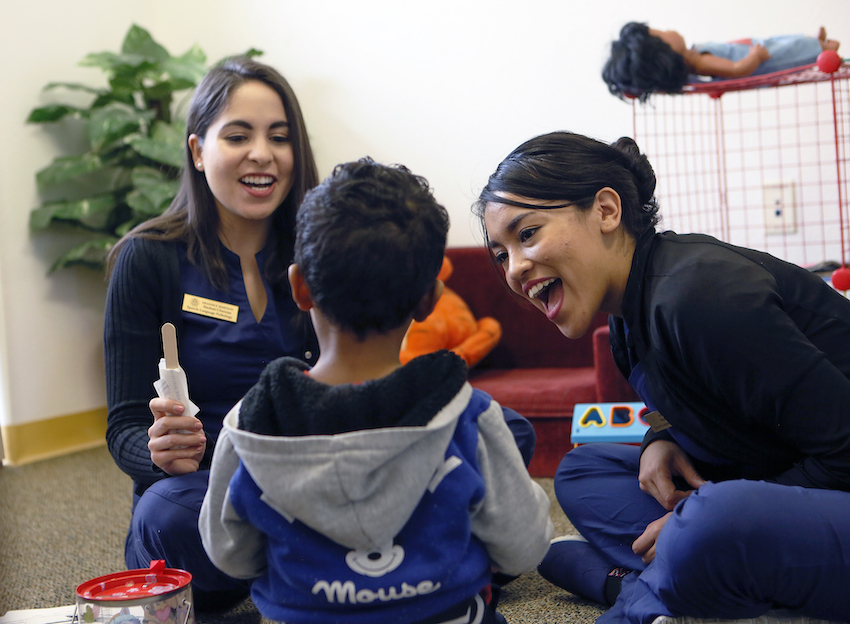
UTEP Receives NSF Grant to Research Speech-Language Pathology AI
Work will promote early diagnosis of speech-language challenges in young children
EL PASO, Texas (Feb. 9, 2023) – The University of Texas at El Paso has been awarded part of a highly competitive grant from the National Science Foundation to conduct research in support of artificial intelligence that will aid speech-language development in young children.

The five-year, $20 million award will create the AI Institute for Exceptional Education, which will be led by the University at Buffalo and will address speech and language development challenges faced by children between the ages of three and 10. The institute will consist of over 30 researchers from nine universities, including UTEP; the University of Washington; Cornell University; the University of Nevada, Reno; Penn State University; the University of Oregon and the University of Illinois Urbana-Champaign.
“While speech processing technology today works very well for grown-up adult speakers, there’s a lot more to do,” said Nigel Ward, Ph.D., professor of computer science and UTEP team lead for the initiative. “What’s most critical for children is the ability to interact with peers and teachers. Efficiently modeling that interactive behavior, and how it differs between typically developing children and those facing challenges, is the problem we will tackle.”
The institute will work to develop two tools: the AI Screener and the AI Orchestrator. The AI Screener will listen to and observe children in the classroom, creating weekly summaries of their speech, expressions and gestures. This data will then be used to suggest, if necessary, an evaluation with a speech-language pathologist. The AI Orchestrator, an app, will support speech-language pathologists with large caseloads – a challenge exacerbated by the COVID-19 pandemic – by providing them with personalized content for each child they serve. All work will abide by ethics and privacy guidelines. Prototypes will first be utilized in roughly 80 classrooms, analyzing nearly 500 kindergarten students.
UTEP’s computer science department will receive $475,000 to aid in the research. Research by Ward and Assistant Professor Diego Aguirre, Ph.D., will focus on computer modeling, which can be used to support automatic screening systems like the AI Screener. Specifically, their work will model patterns of interaction such as intonation, timing and rhythm.
“Think of someone who listens to you without ever nodding or saying ‘uh-huh,’ or who cuts you off before you finish your sentences. You’d be annoyed. Most people don’t do this. Instead, they properly engage,” Ward said. “They can do this because they learned, as small children, the basic patterns of interaction.”
Ward and Aguirre, along with Jonathan Avila, a student in the computer science Ph.D. program, will model these patterns of interaction, with an emphasis on computational methods. UTEP’s computer science department has a history of collecting such data to formalize measures of similarity, such as those between a child experiencing speech-language challenges and those developing normally.
Their work, along with the work of the AI Institute for Exceptional Education as a whole, will promote early diagnosis of speech-language challenges in young children.
“Diagnosis of speech and language disorders as early as possible is crucial to a child’s cognitive, linguistic, social and emotional development,” said Vanessa Mueller, Ph.D., director for UTEP’s Speech-Language Pathology program. “Early diagnosis leads to early intervention, which is key to ensuring the child’s highest possible potential is realized.”
About The University of Texas at El Paso
The University of Texas at El Paso is America’s leading Hispanic-serving university. Located at the westernmost tip of Texas, where three states and two countries converge along the Rio Grande, 84% of our 24,000 students are Hispanic, and half are the first in their families to go to college. UTEP offers 169 bachelor’s, master’s and doctoral degree programs at the only open-access, top-tier research university in America.
Last Updated on February 09, 2023 at 12:00 AM | Originally published February 09, 2023
By MC Staff UTEP Marketing and Communications
